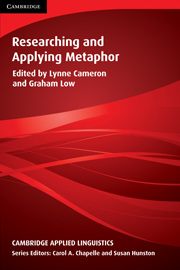Book contents
- Frontmatter
- Contents
- List of contributors
- Acknowledgements
- Conventions
- Series editors' preface
- Preface
- I KEY ISSUES IN METAPHOR RESEARCH
- II FROM THEORY TO DATA
- III ANALYSING METAPHOR IN NATURALLY OCCURRING DATA
- IV ANALYSING METAPHOR IN ELICITED DATA
- 10 “Captain of my own ship”: Metaphor and the discourse of chronic illness
- 11 “This paper thinks …”: Investigating the acceptability of the metaphor an essay is a person
- 12 When is a dead rainbow not like a dead rainbow? A context-sensitive method for investigating differences between metaphor and simile
- References
- Index
11 - “This paper thinks …”: Investigating the acceptability of the metaphor an essay is a person
Published online by Cambridge University Press: 05 October 2012
- Frontmatter
- Contents
- List of contributors
- Acknowledgements
- Conventions
- Series editors' preface
- Preface
- I KEY ISSUES IN METAPHOR RESEARCH
- II FROM THEORY TO DATA
- III ANALYSING METAPHOR IN NATURALLY OCCURRING DATA
- IV ANALYSING METAPHOR IN ELICITED DATA
- 10 “Captain of my own ship”: Metaphor and the discourse of chronic illness
- 11 “This paper thinks …”: Investigating the acceptability of the metaphor an essay is a person
- 12 When is a dead rainbow not like a dead rainbow? A context-sensitive method for investigating differences between metaphor and simile
- References
- Index
Summary
Introduction
The following passage comes from a book of edited research papers on language programme evaluation and formed the starting point for the present study.
… assessment is not only a difficult area but dangerous and sensitive too. And if it's difficult and dangerous to assess other people, is it more or less difficult and dangerous to assess ourselves? This paper doesn't know the answer to that question…. Can learners really begin to diagnose themselves with regard to their own educational attainments as these must have some bearing on their future requirements?
This paper thinks that they might, and more to the point thinks in addition that in certain situations there is no valid educational alternative.
[Paragraph concluding that tests resemble teaching materials in that they are educationally unsound if they ‘fail to further, or even detract from’ learning]
It is for this reason that this paper, accepting that educational systems are at present dependent on an amount of assessment activities, has been arguing for self-assessment as an improvement over testing.
(Kenny & Hall, 1987: 462–463)I have to teach university students how to improve their academic writing in English as a foreign language and thus need to provide them with guidelines on acceptability. To me, the first four bolded expressions in the extract above are totally unacceptable English, whether in a research paper or anywhere else; papers cannot think, know or accept. The fifth (arguing) is a grey area; I am not sure whether it sounds acceptable or not.
- Type
- Chapter
- Information
- Researching and Applying Metaphor , pp. 221 - 248Publisher: Cambridge University PressPrint publication year: 1999
- 14
- Cited by



